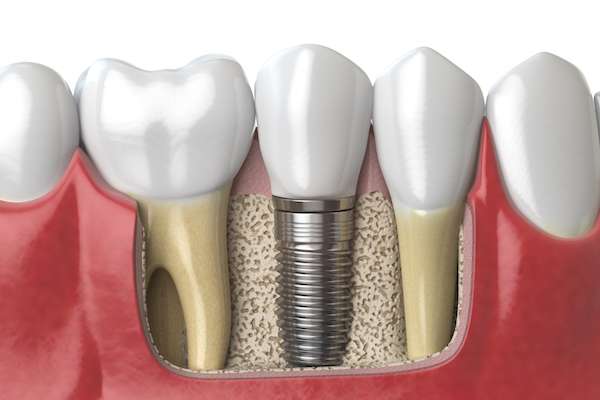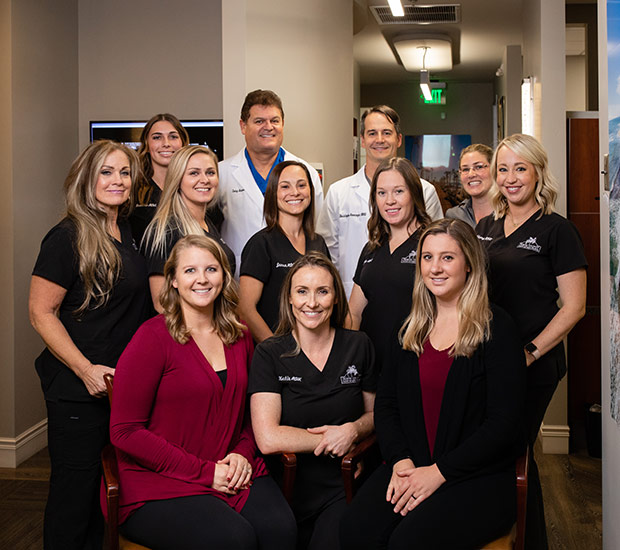Dental Implants for Replacing Missing Teeth
 People with large gaps from missing teeth can often benefit greatly from dental implants. A dentist may suggest implants for patients who seem to struggle with personal appearance, speaking, or chewing and eating. While there are other avenues to pursue for replacing missing teeth, this type of dental procedure can work well for patients who do not want regular dentures or have had little luck with other artificial replacements, such as bridges.
People with large gaps from missing teeth can often benefit greatly from dental implants. A dentist may suggest implants for patients who seem to struggle with personal appearance, speaking, or chewing and eating. While there are other avenues to pursue for replacing missing teeth, this type of dental procedure can work well for patients who do not want regular dentures or have had little luck with other artificial replacements, such as bridges.
Reasons to undergo surgery
Dental implants can do more for a patient than recreate a beautiful smile. Impacts have been shown psychologically and physically in those who receive these subtle dental appliances. Knowing how an implant can positively affect someone’s everyday living can encourage patients to discuss implant options with a dentist. Here are the top reasons patients invest in the procedure:
Improved oral health
When teeth are lost, the jawbone can steadily deteriorate over time without the extra support provided by teeth roots. Patients may struggle with daily functions, such as chewing and biting, which can impact essential dietary needs. By filling in those gaps, the jawbone can grow healthier and patients can eat properly.
Improved smile
Many people with missing teeth take care to smile with closed lips. They may also have difficulty speaking, which can lead to embarrassment and social shyness. Artificial teeth are matched to blend in smoothly with natural teeth, allowing patients to smile and speak without hindrances.
Lasting durability
Most denture and bridge dental options need to be replaced within the decade — sometimes sooner — requiring patients to visit the dentist more frequently. Dental implants are built to last a lifetime and seldom need replacing. So long as patients maintain good oral hygiene habits, even removable options have great durability and lifespans.
The surgery process
An implant comes in three parts. The first is a metal post that is screwed into a person’s jawbone below the gumline. A middle piece called an abutment is attached to the post just on top of the gums. The third and final piece is the crown that acts as an artificial tooth. From start to finish, the procedure of securing these three parts can take months due to necessary healing times in between surgery and placement appointments. Some steps in the process can be skipped or combined in one visit depending on the individual’s choice of implant.
Implant options
The procedure may take more time depending on the implant a patient receives. There are three main types:
- Single implant: A patient receives one implant to replace a single missing tooth
- Implant-supported bridge: A dental bridge is secured by implants for patients missing two or more consecutive teeth in a row
- Implant-supported dentures: A full denture is attached to several implants when most teeth are missing
Conclusion
Discussing these options and the procedures involved with each can help patients decide on whether receiving dental implants is the right choice. Never hesitate to bring up issues of missing teeth with a dentist.
Request an appointment or call North County Cosmetic and Implant Dentistry at 760-940-2273 for an appointment in our Vista office.
Recent Posts
Welcome to North County Cosmetic and Implant Dentistry, your trusted partner for comprehensive dental care in San Diego. Today, we'll delve into a topic that has revolutionized the field of restorative dentistry – "All on Four" and implant-supported dentures. Understanding the difference between these two options is crucial for making informed decisions about your oral…
The holiday season is a time for merry gatherings, joyous moments, and, of course, indulging in our favorite culinary delights. For those with dental implants, this festive period takes on a whole new dimension when it comes to savoring and relishing every bite. For many people who struggle with tooth decay and loss, eating their…
Sara is as big-hearted as you can get. With a calling and talent to serve others, Sara found purpose volunteering at orphanages across the world, especially in India.Unfortunately, Sara also had struggles with mental health. A combination of anxiety, depression, and eating disorders had ravaged her body. As a result, her oral health took a…







